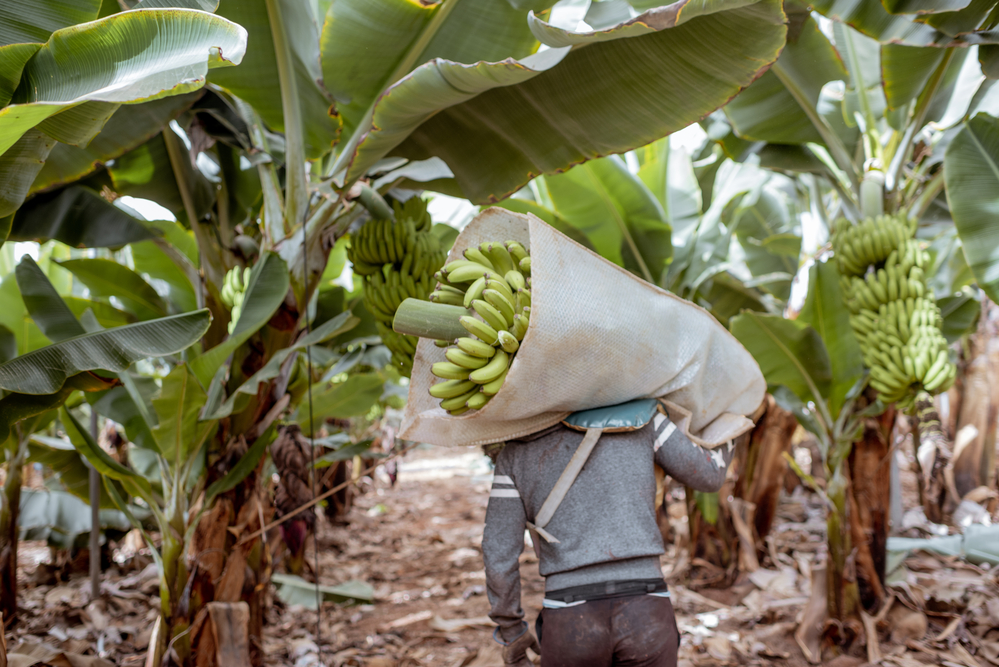A banana “pandemic” caused by the Tropical Race 4 (TR4) strain of the Fusarium fungus is devastating the crop in several countries. Coordinated public-private efforts are needed to generate knowledge and build capacities to contain the disease.

San Jose, 16 February 2021 (IICA). Bananas, a key crop for global food security and the livelihoods of millions of small-scale farmers, are facing the most serious threat in decades: the Tropical Race 4 (TR4) strain of the Fusarium fungus, which has triggered a pandemic on banana plantations and is devastating the crop in numerous countries.
TR4 causes a disease that spreads very easily and is already present in Latin America and the Caribbean. There is no known cure, which makes it necessary for various public and private stakeholders to engage in coordinated efforts to generate scientific knowledge, build capacities among producers and contain the disease. This would allow for guaranteeing the continuous production of a crop that is a source of food and income for a significant part of the population, especially in developing countries.
This was one of the ideas shared by Gert Kema and Chelly Hresko, two of the specialists who have conducted the greatest amount of research on this topic in the world, during a discussion organized by the Inter-American Institute for Cooperation on Agriculture (IICA).
“It may be surprising to learn how important bananas are for many people, especially vulnerable populations, whose food choices are limited. Bananas account for up to 25% of their daily calorie intake. And bananas are grown in 135 countries, so the crop is a source of income for countless small-scale producers”, remarked Hresko.
Hresko, Head of Innovation in Research and Development for Diseases and Agricultural Efficiency at Bayer’s Biotechnology Division, added: “The main difficulty we face is that we can’t count on the magic of chemistry to get rid of this disease. All we can do, while developing scientific knowledge, is to train producers on the best containment measures. It’s a very complex challenge”.
Kema explained that the TR4 strain of the Fusarium fungus attacks the Cavendish banana variety, which accounts for approximately 50 percent of global banana production, 95 percent of export markets and is the only variety that is mass marketed in Latin America and the Caribbean and in the Western hemisphere in general.
Cavendish has been the dominant variety in global markets for the past 70 years, due to its natural resistance to Fusarium Race 1, which decimated the production of Gros Michel bananas—previously the most widespread variety.
“Cavendish has offered such a wonderful solution over the past 70 years, that virtually no research has been carried out to understand exactly what the TR4 disease is and how to protect plantations from it”, stated Kema, head of the plant pathology laboratory at Wageningen University in the Netherlands, which studies diseases in plants.
“Therefore, it is not surprising that, following the emergence of this disease, it became a threat to production in a very short amount of time. We are now facing a situation that, in a way, is reminiscent of what occurred with the Gros Michel variety”, he added.
The expert explained that the disease, now a global threat, was first detected in Jordan, but originated in Southeast Asia, just like the banana crop itself. “TR4 is a Fusarium strain that emerged in Indonesia, spread to the rest of Southeast Asia and is now moving west, advancing through India, Pakistan, the Middle East, Africa and, more recently, Colombia”.
The presence of the disease in Colombia —the only country in Latin America and the Caribbean where it is currently present—was officially confirmed in 2019 by the Colombian Agricultural Institute (ICA), which detected it on plantations in the northern region of the country. It is unclear how or why it got there.
“It could have happened in any other banana-growing country in Latin America or the Caribbean. It’s been completely random”, stated Kema.
The scientist, who has 38 years of experience in the field of plant pathology, explained, “We know that the disease is transmitted through soil, but we have no reason to conclude that contamination is spread through the transportation of bananas. We agree that the main contributor is human travel and, in that sense, the banana sector is greatly at risk, because workers often travel from one country to another”, explained Kema.
It is therefore necessary, as a precautionary measure, to guarantee adequate hygiene among those closely involved in banana farming. “If you wear your boots on a plantation in the Philippines and then wear them again in Costa Rica, that is very dangerous. If the soil is contaminated, it contaminates your shoes, your clothes and your tools”, explained Kema.
The expert recommended that producers reduce the number of visitors on their plantations and that, if there is no other alternative but to receive visitors, that they “arrive clean and leave clean”, to avoid the risk of them bringing in or spreading the disease.
Chelly Hresko added that the first disease caused by the Fusarium fungus, during the first half of the 20th century, which killed the Gros Michel banana variety, spread at a much slower rate because people were not traveling around the world as much.
In that sense, the strict travel restrictions that have been implemented in response to the Covid-19 pandemic, may help curb the spread of TR4.
More information:
Institutional Communication Division











